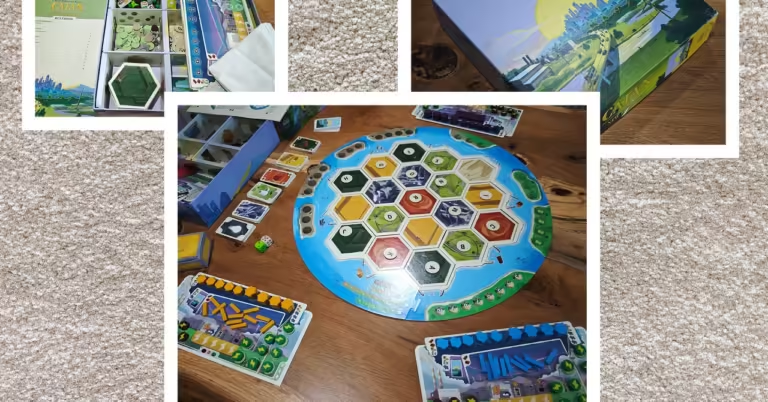Not everyone does that. We all know board games have a side of existential crisis, and that’s what you get with Catan: New Energies. It brings the beloved classic Catan into the modern era with a clever portrayal of fossil fuels and renewable energy, an ingenious climate crisis mechanic, and the consequences of not working towards a greener world. This standalone board game for 2-4 players doesn’t require the original version, but experienced players will find it easier to follow.
The message is clear, but the creators haven’t forgotten about flow and fun. Catan’s addictive charm, trading, room for multiple strategies, and variety in playthroughs are all there. It’s familiar enough to attract old fans, and fresh enough to draw new ones in. New Energies also gets its point across well, and the first time we played it, it sparked long and interesting conversations with my kids about why climate change is happening and why some people don’t support fighting it.
New Age Catan
For those who don’t know, Settlers of Catan was first published in 1995. The game is set on a fictional medieval island with randomly placed hexagonal tiles, making it a game that never gets boring. Players must spend resources such as wood and grain to build roads, towns, and cities. Resources are collected and traded by rolling dice to determine which tiles will be awarded each turn. A heist mechanic spices up the game if someone rolls a 7, and victory points are awarded through additional achievements and cards. The first player to reach 10 victory points is the winner.
Photo: Simon Hill
Five editions and various expansions have been released over the years, and for the 20th anniversary edition in 2015, the game was rebranded as simply Catan. Over 45 million copies have been sold in various formats. Catan: New Energy is a standalone game rather than an expansion, which was first conceived over a decade ago and then shelved until creator Klaus Teuber and his sons decided to revive it during lockdown.
All the basic mechanics remain: randomly generated maps of hexagonal tiles, resource gathering and trading, races for 10 victory points, etc., but with some additions and a modern makeover. Energy is a new resource, collected by building power plants, which can support one town and up to three cities. The energy you generate can be used for new science cards and other resources needed to build power plants.
Fossil fuel power plants require one science card, renewable energy power plants require three science cards, and you start the game short on cards. The problem is that building fossil fuel power plants increases the risk of climate disasters, which increases something called your local footprint. Each player must draw one brown event token from a bag at the start of their turn, and these stack up to create climate events. Most of them have negative effects, such as hazards that prevent cities from gaining resources during a turn, and tend to disadvantage the player with the highest local footprint.
Photo: Simon Hill


1 Comment
Can you be more specific about the content of your article? After reading it, I still have some doubts. Hope you can help me.